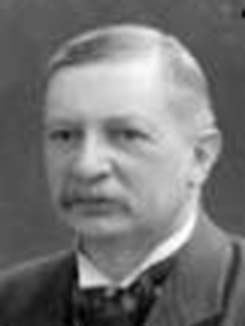
Johannes Robert Rydberg
 المؤلف:
C L Maier
المؤلف:
C L Maier
 المصدر:
Biography in Dictionary of Scientific Biography
المصدر:
Biography in Dictionary of Scientific Biography
 الجزء والصفحة:
...
الجزء والصفحة:
...
 26-2-2017
26-2-2017
 789
789
Born: 8 November 1854 in Halmstad, Sweden
Died: 28 December 1919 in Lund, Sweden

Johannes Rydberg's father was Sven Rydberg while his mother was Maria Anderson. Johannes attended school in Halmstad which is in southwestern Sweden, on the eastern shore of the Kattegat, at the mouth of Nissan River. He completed his secondary school education at the Gymnasium in Halmstad in 1873 and in the same year he entered the University of Lund. The University of Lund, in the town of Lund in southern Sweden northeast of Malmo, is the second oldest university in Sweden being founded in 1666.
Rydberg received his bachelor's degree in 1875 from the University of Lund. He continued his study of mathemtics and wrote a dissertation on conic sections for his doctorate in mathematics which was awarded in 1879. The following year he was appointed to the post of lecturer in mathematics at Lund but his interests were now turning towards mathematical physics rather than to pure mathematics. During his two years as a lecturer in mathematics he worked on problems relating to electricity.
In 1882 Rydberg moved from a lectureship in mathematics to become a lecturer in physics at Lund. Ten years later he was promoted to assistant at the Physics Institute. In 1879 he was promoted to a professorship in physics but the was only a temporary position until it was confirmed as a permanent appointment in March 1901. From this time until his retirement in 1919 he held the chair of physics at Lund. However, his health deteriotated during the time that he held the chair and he became seriously ill in 1914. Although he continued to hold the chair he took sick leave in 1914 and was absent from the university from that time on. His final retirement came five years after he had ceased to be able to work and came only a few weeks before his death.
Manne Siegbahn, who had been a student of Rydberg from 1906 to 1911, then Rydberg's assistant from 1911 to 1914, took over his teaching duties in 1914. He carried these out until Rydberg formally retired in 1919, then early in 1920 he was appointed to Rydberg's chair of physics. Siegbahn wrote the biography of Rydberg [5].
Rydberg's most important work is on spectroscopy where he found a relatively simple expression relating the various lines in the spectra of the elements (1890). He hoped to determine the structure of the atom but, although his work did provide the basis for the structure theory, he himself did not reach his goal.
- C L Maier, Biography in Dictionary of Scientific Biography (New York 1970-1990).
http://www.encyclopedia.com/topic/Johannes_Robert_Rydberg.aspx
- Biography in Encyclopaedia Britannica.
http://www.britannica.com/eb/article-9064544/Johannes-Robert-Rydberg
Books:
- Proceedings of the Rydberg Centennial Conference on Atomic Spectroscopy, Acta Universitatis lundensis 50 (1954).
Articles:
- N Bohr, Rydberg's discovery of the spectral laws, in Proceedings of the Rydberg Centennial Conference on Atomic Spectroscopy, Acta Universitatis lundensis 50 (1954), 15-21.
- W Pauli, Rydberg and the periodic system of the elements, in Proceedings of the Rydberg Centennial Conference on Atomic Spectroscopy, Acta Universitatis lundensis 50 (1954), 22-26.
- M Siegbahn, Johannes Robert Rydberg, in Swedish men of science (Stockholm, 1952), 214-218.
- Sister St John Nepomucene, Rydberg : The Man and the Constant, Chymia 6 (1960), 127-145.
 الاكثر قراءة في 1850to1859
الاكثر قراءة في 1850to1859
 اخر الاخبار
اخر الاخبار
اخبار العتبة العباسية المقدسة


